Last updated: September 2025
Applying for a rental in California can feel like an audit. Whether you’re moving to a San Francisco apartment or leasing a home in Los Angeles, landlords often ask for pay stubs and bank statements to confirm affordability. These documents look simple, but rules differ across the United States, United Kingdom and Canada. Knowing what you must provide—and what you may lawfully redact—prevents delays and denials.
FinancialDocsProvider.com specializes in formatting and organizing genuine documents. We never change facts; we focus on legibility, completeness and compliance. This guide explains the rules that govern pay stubs and bank statements for California rentals, compares standards in other markets and gives you a compliance‑first toolkit. If you’re worried about privacy or unsure what landlords can request, you’re in the right place.
Related Entities & Terms
- Proof of income, affordability assessment, tenant referencing
- Pay stub / payslip / payroll statement / remittance advice
- W‑2 and 1099 (US); P60, P45, SA302 (UK); T4, T4A and Notice of Assessment (NOA) (Canada)
- Bank statements, transaction history, deposit verification
- Self‑employment: invoices, ledgers, profit & loss statements
- Consumer Financial Protection Bureau (CFPB), Federal Trade Commission (FTC) and Internal Revenue Service (IRS) in the US
- Financial Conduct Authority (FCA) and HM Revenue & Customs (HMRC) in the UK
- Financial Consumer Agency of Canada (FCAC) and Canada Revenue Agency (CRA)
- Fair Housing and Employment Act (FEHA), California Consumer Privacy Act (CCPA), Fair Credit Reporting Act (FCRA)
- Anti‑Money Laundering (AML) and Know Your Customer (KYC) regulations
What are the legal basics of pay stubs and bank statements for California rentals?
In California, landlords may request pay stubs and bank statements to verify income, but they must respect privacy and anti‑discrimination laws. Authentic, unaltered records are required across jurisdictions. Fraudulent edits can trigger denials and legal consequences.
California and US context. Rental applications typically require recent pay stubs, tax returns or bank statements to verify steady income:contentReference[oaicite:0]{index=0}. The FEHA’s source‑of‑income rules went further in January 2024: housing providers must give applicants who use housing subsidies an opportunity to prove they can pay their share, and they must consider evidence such as bank statements or pay stubs:contentReference[oaicite:1]{index=1}. Landlords cannot discriminate based on how you earn income, and they must safeguard sensitive data. Federal laws like the FCRA and ECOA also prohibit discriminatory screening.
United Kingdom. Lettings agents and councils often ask for payslips and recent bank statements. GOV.UK guidance for the housing benefit programme states that applicants must provide their most recent payslips and bank or building‑society statements for the last two full months as supporting evidence:contentReference[oaicite:2]{index=2}. UK data‑protection laws, including the Data Protection Act and GDPR, allow redaction of non‑relevant transactions.
Canada. Landlords may request proof of income, but they must follow PIPEDA and provincial tenancy laws. For certain immigration and housing programmes, the Government of Canada accepts bank statements or bank letters showing account numbers, dates opened, current balances and the average balance over six months as proof of funds:contentReference[oaicite:3]{index=3}. While standards vary by province, most landlords ask for recent pay stubs or bank statements covering two or three months.
Practical implications for California applicants. Expect to share two to three recent pay stubs and corresponding bank statements. Provide documents that are readable, complete and clearly tied to your name and employer. Redact only what is unnecessary for verification, and store submitted copies securely.
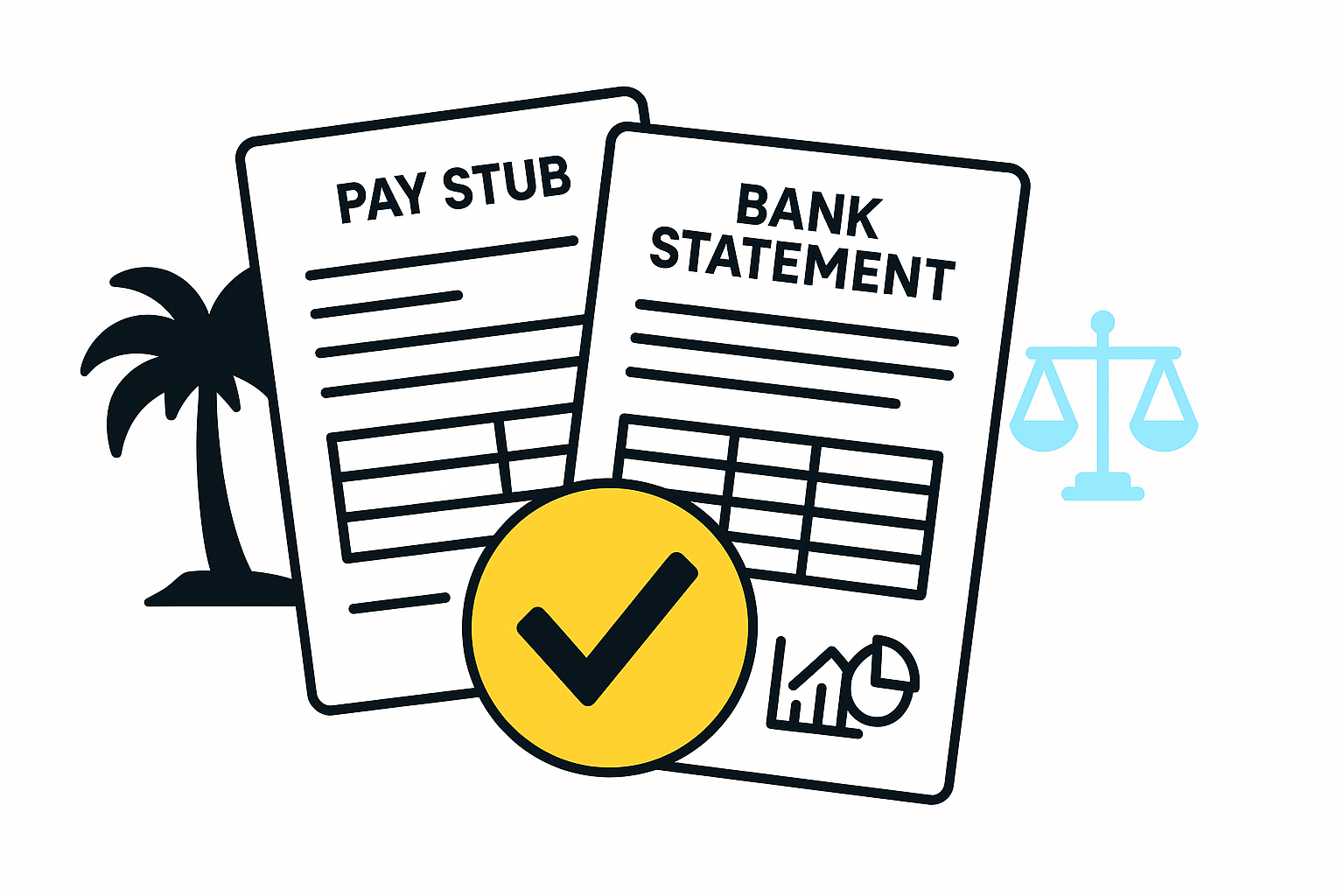
Which edits are allowed on pay stubs and bank statements?
Edits that improve readability, privacy or technical compatibility are generally allowed. You can reformat files, redact sensitive data and combine pages—so long as you do not change facts. The aim is clarity for reviewers without altering content.
Permitted adjustments.
- Redaction of sensitive information. You may black out account numbers, Social Security or National Insurance numbers and other identifiers, provided the remaining content is readable. In the UK, redacting non‑essential transactions from bank statements is accepted under data‑protection laws.
- Correcting layout and orientation. Rotate, merge and reorder pages to present a coherent packet. Fixing upside‑down scans or out‑of‑sequence statements improves review speed.
- File conversion and compression. Convert images or spreadsheets to PDF, compress large files and flatten layers to meet portal requirements, such as PDF/A, without changing the data.
- Enhancing legibility. Adjust brightness or contrast, remove scan artefacts and sharpen text so underwriters can read the numbers. Never obscure content or modify values.
- Translation and currency notation. Provide an English translation or a simple currency conversion note while keeping original amounts visible. Add brief footnotes rather than overwriting figures.
- Annotations for context. Short notes that identify recurring deposits or explain reimbursements are fine when they do not alter the source records. Use a cover page to summarize what’s attached.
- Bookmarks and page labels. Adding bookmarks, page numbers and document titles improves navigation in multi‑month packets and is widely accepted.
Examples. A gig‑economy worker in Oakland with four clients might highlight incoming payments and redact grocery transactions so the landlord can quickly confirm income. A London renter can combine multiple payslips into a single PDF, order them chronologically and redact a National Insurance number. A newcomer to Toronto might add a short note explaining that deposits are in GBP and include a conversion table below, leaving the original figures intact.
Across all markets, the principle is transparency. Edit for clarity or privacy; never edit to mislead. If in doubt, include a note or seek professional guidance.
What pay stub or bank statement edits are illegal?
Any edit that changes facts is illegal. Altering numbers, dates, employers or payees to present a stronger financial picture constitutes fraud and can carry civil or criminal penalties.
Examples of prohibited alterations.
- Changing amounts. Inflating gross or net pay, increasing balances or adding deposits that never occurred is fraud. Landlords and lenders often verify totals against tax returns or payroll systems.
- Backdating or altering pay periods. Shifting pay dates to appear more recent or stretching pay periods to hide gaps misrepresents employment status.
- Adding or deleting payees. Substituting an employer’s name or removing overdraft fees to conceal financial issues is falsification.
- Fake or “template” documents. Downloading generic pay stub templates or “proof of income” PDFs and inserting personal details crosses into fabrication. Many underwriters recognize common templates and will reject the application.
Consequences. Fraud can lead to denial, blacklisting by property managers and prosecution. Screening companies share data, so a record of falsification may follow you for years. Regulators such as the IRS, HMRC and CRA may investigate if fake documents are used for tax or credit applications.
How reviewers spot falsification. Underwriters compare deposits to pay‑stub net pay, review metadata, and check employer details. Inconsistencies in fonts, spacing or decimal precision are also red flags. Automated tools may flag altered PDFs, so accuracy and honesty are essential.
FinancialDocsProvider.com does not offer or condone illegal editing. Our service focuses on organizing and formatting the genuine documents you already have. If your records contain errors, work with your employer or bank to correct them at the source.
When do you need professional document formatting?
Professional help matters when your income story is complex or the stakes are high. Clear, reconciled documents reduce questions and speed decisions. The following scenarios show when expert formatting makes approval more likely.
1. Renters competing in hot markets. In California’s competitive rental scene, you often must provide more than a credit score. Landlords may request two or three months of pay stubs and bank statements to confirm you can afford the rent:contentReference[oaicite:4]{index=4}. Formatting that highlights direct deposits, aligns pay periods and links stubs to matching bank entries streamlines review. Mini‑scenario: Two roommates apply in San Diego. A cover page summarizing each person’s income and linked deposits helps the landlord approve faster.
2. Self‑employed applicants. Freelancers, contractors and gig workers rarely receive traditional pay stubs. Instead, they rely on invoices, profit‑and‑loss statements and irregular bank deposits. To show proof of income, you may need six months of bank statements, 1099s, T4 or NOA documents and a simple ledger. A professional editor assembles these into a clean package, highlights recurring income and notes seasonality. Mini‑scenario: A rideshare driver combines weekly payout emails, a quarterly P&L and bank statements that show the matching deposits.
3. Auto loans and SBA financing. For car purchases and SBA loans, underwriters usually request pay stubs, tax returns and several months of bank statements. They cross‑check deposits against pay‑stub net pay and review dates. A professional review ensures that the numbers reconcile and that each figure traces back to an official source. Mini‑scenario: An LLC owner adds a simple reconciliation table showing how business draws appear in personal statements.
4. International renters and newcomers. Expats moving to the UK or Canada often receive pay in another currency or need translations. Currency conversions should be clearly noted and original amounts must remain visible. When applying for UK housing benefit, for example, you must provide recent payslips and bank statements as supporting evidence:contentReference[oaicite:5]{index=5}. A professional can translate, annotate and organize these documents to meet local requirements.
5. Subsidy or voucher programmes. In California, applicants using housing vouchers must be allowed to prove their rent share with verifiable evidence such as bank statements or pay stubs:contentReference[oaicite:6]{index=6}. Clear formatting helps housing authorities process files quickly. Tip: Include the voucher letter and a short note estimating your monthly share with references to specific bank deposits.
6. Joint applications and co‑signers. Co‑applicants often submit documents from different employers and banks. Standardizing file names, page order and summaries makes review easier. A one‑page overview that lists each person’s income source and deposit cadence can prevent confusion.
7. Students and recent graduates. You may rely on part‑time income, savings or support from family. Present bank statements that show savings history, a letter confirming support and any pay stubs you have. A simple note explaining your expected income after graduation can help.
In each case, the goal is a truthful, coherent story. Organized packets signal diligence and transparency—qualities landlords and underwriters reward.
How does our process work?
Our workflow is structured and compliance‑first. We focus on privacy, document reconciliation and clear presentation. You get ready‑to‑submit files without any factual changes.
1. Intake and consultation. Contact our team and outline your goal—California apartment, auto loan or visa. We explain what documents are required and provide a secure upload portal. We never ask for account passwords; you upload PDFs or scans directly.
2. Reconciliation and verification. Our editors review pay stubs, bank statements and supporting documents to ensure they reconcile. If deposits on bank statements do not match pay‑stub net pay, we flag the discrepancy for correction before submission. This step reduces back‑and‑forth and denials.
3. Formatting and organization. We rotate, reorder and merge files; add page numbers and bookmarks; redact unnecessary personal data; and ensure the final documents meet portal size and format requirements. We never alter amounts, dates, employer names or balances.
4. Quality check and delivery. A second editor reviews for accuracy and legibility. Once approved, we deliver the final package via secure download. Turnaround times depend on the volume and complexity of documents but typically range from a few hours to one business day.
5. Post‑delivery support. If a landlord or underwriter requests additional months or specific pages, we can quickly update the packet. Our aim is to help you move through the application process smoothly.
For more details on services—such as pay‑stub formatting or bank‑statement reconciliation—visit our proof of income editing page. You can also review our pricing or about our process.
What belongs on your compliance checklist?
Preparation prevents mistakes. Use this checklist to assemble, verify and present your documents before sending them to a landlord, lender or agency. A careful review now avoids costly delays later.
- Gather the right documents. Collect at least two months of pay stubs and bank statements. If paid weekly, gather the last five pay stubs; if paid monthly, gather at least two:contentReference[oaicite:7]{index=7}. Self‑employed applicants should include invoices, 1099s, T4 or NOA forms and a basic profit‑and‑loss statement.
- Verify consistency. Confirm that pay‑stub net pay matches each bank deposit. Dates should align and employer names should be consistent. Note irregular items, such as reimbursements or bonuses, in a brief cover note.
- Redact sensitive data. Black out full account numbers, Social Security or National Insurance numbers and unrelated transactions. Leave the last four digits visible to help reviewers match deposits.
- Check completeness. Make sure each bank statement includes all pages and that pay stubs show year‑to‑date totals and deductions. Missing pages or cut‑off lines are red flags.
- Convert and compress. Combine files into a single PDF, meet portal size limits and convert images to searchable PDF/A. Use descriptive file names (e.g., “2025‑06_to_2025‑08_Paystubs.pdf”).
- Include supporting documents. For subsidies or vouchers, attach voucher documentation. For international income, include a translation or a conversion table. Add IDs if requested (driver’s licence, passport).
- Explain edge cases. Provide a one‑page note for maternity leave, medical leave, new jobs or seasonal income. Point to the exact pages that support your explanation.
- Standardize dates and units. Use a consistent date format (YYYY‑MM‑DD) and, if needed, list currency codes (USD, GBP, CAD) near converted amounts.
- Keep a record. Save originals, the submitted packet and your cover note in a secure folder. Record submission dates and recipients for future reference.
Completing this checklist reduces the chance of rejection. If you want help assembling your packet, our team can handle formatting and reconciliation for you.
What red flags cause rejections?
Screeners are trained to find inconsistencies and signs of tampering. Many checks are automated, and small errors can cascade into denials. Address anomalies up front with documentation.
- Missing or incomplete documents. Skipping pages, omitting pay stubs for a period or providing partial statements raises immediate concerns.
- Inconsistent information. Names that differ across documents, mismatched dates or deposits that do not correspond to pay stubs are major red flags:contentReference[oaicite:8]{index=8}.
- Unusual formatting. Mixed fonts, irregular spacing or obvious copy‑and‑paste marks suggest tampering. Over‑redaction that hides relevant data can also trigger rejection.
- Round numbers and improbable totals. Perfectly round pay figures or evenly spaced deposits may indicate fabrication. Real stubs usually include cents and fluctuating amounts due to taxes and deductions.
- Missing transaction history. For self‑employed applicants, no invoicing trail or a sudden surge of deposits just before applying looks suspicious.
- Previous denials or adverse action notices. A prior denial for misrepresentation or poor credit can follow you. In California, landlords must provide an adverse action notice explaining why they denied your application:contentReference[oaicite:9]{index=9}.
- Metadata anomalies. PDF creation dates that conflict with pay periods, or documents created long after the supposed issue date, invite scrutiny.
- Bank or employer mismatches. Employer names that differ from direct‑deposit descriptions, or statements that lack a recognizable financial institution header, can stall approvals.
Be proactive. If anything might be read as a discrepancy, add an explanation or supporting email from your employer or bank.
Where can you find official resources and further reading?
Authoritative sources help you understand your rights and obligations. Start with government guidance, then consult reputable financial and housing sites for practical tips. When in doubt, follow the official documentation.
- California Civil Rights Department. Their Fair Housing and Source of Income FAQ explains that landlords must allow voucher holders to present bank statements or pay stubs as evidence they can pay their share:contentReference[oaicite:10]{index=10}.
- GOV.UK Housing Benefit guide. The Supporting your claim page lists the evidence required for housing benefit claims, including recent payslips and bank statements:contentReference[oaicite:11]{index=11}.
- Government of Canada proof‑of‑funds guidance. Immigration Canada’s proof of funds page explains that bank statements and official letters from financial institutions demonstrating account balances are acceptable:contentReference[oaicite:12]{index=12}.
- Consumer Financial Protection Bureau. Visit the CFPB’s official site for guides on fair lending, tenant screening and privacy rights.
- FinancialDocsProvider.com resources. For deeper insights, read our posts on creating pay stubs for apartment applications, Florida landlord bank statement requests and common legal mistakes in bank statement editing. You can also explore our bank statement formatting service and contact our team for tailored support.
Frequently Asked Questions
- Do California landlords have to accept pay stubs as proof of income?
- No law requires landlords to accept pay stubs exclusively, but most request recent pay stubs or bank statements to confirm affordability:contentReference[oaicite:13]{index=13}. Under source‑of‑income rules, California landlords must consider verifiable evidence provided by voucher holders, which can include bank statements and pay stubs:contentReference[oaicite:14]{index=14}.
- Is it legal to edit a pay stub or bank statement?
- Editing for readability, privacy or formatting—such as redacting account numbers or correcting orientation—is legal. Altering amounts, dates, payees or creating fake documents is fraud. Our service focuses on lawful formatting; we never change factual content.
- What documents should self‑employed renters submit?
- Provide three to six months of bank statements, invoices or ledger reports, tax forms like 1099s (US), T4/NOA (Canada) or SA302 (UK), and a simple profit‑and‑loss statement. Highlight recurring revenue and include any contracts that support future income.
- How can I protect my privacy when sharing bank statements?
- Redact full account numbers and unrelated transactions. Share documents from your bank’s secure portal, and ask how the landlord or underwriter stores and uses your data. US, UK and Canadian data‑protection laws allow you to limit use of your information.
- What happens if my application is denied due to document issues?
- In California, landlords must issue an adverse action notice explaining why an application was denied:contentReference[oaicite:15]{index=15}. Review the notice, correct any discrepancies and resubmit complete, consistent documents. Consider professional formatting to prevent repeat issues.
Need accurate, reliable financial documents fast? Contact FinancialDocsProvider.com now.
By the FinancialDocsProvider Editorial Team. We help renters, business owners and self‑employed professionals present their income documents with clarity and compliance. Learn more about our team.

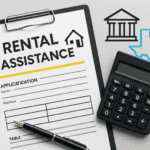
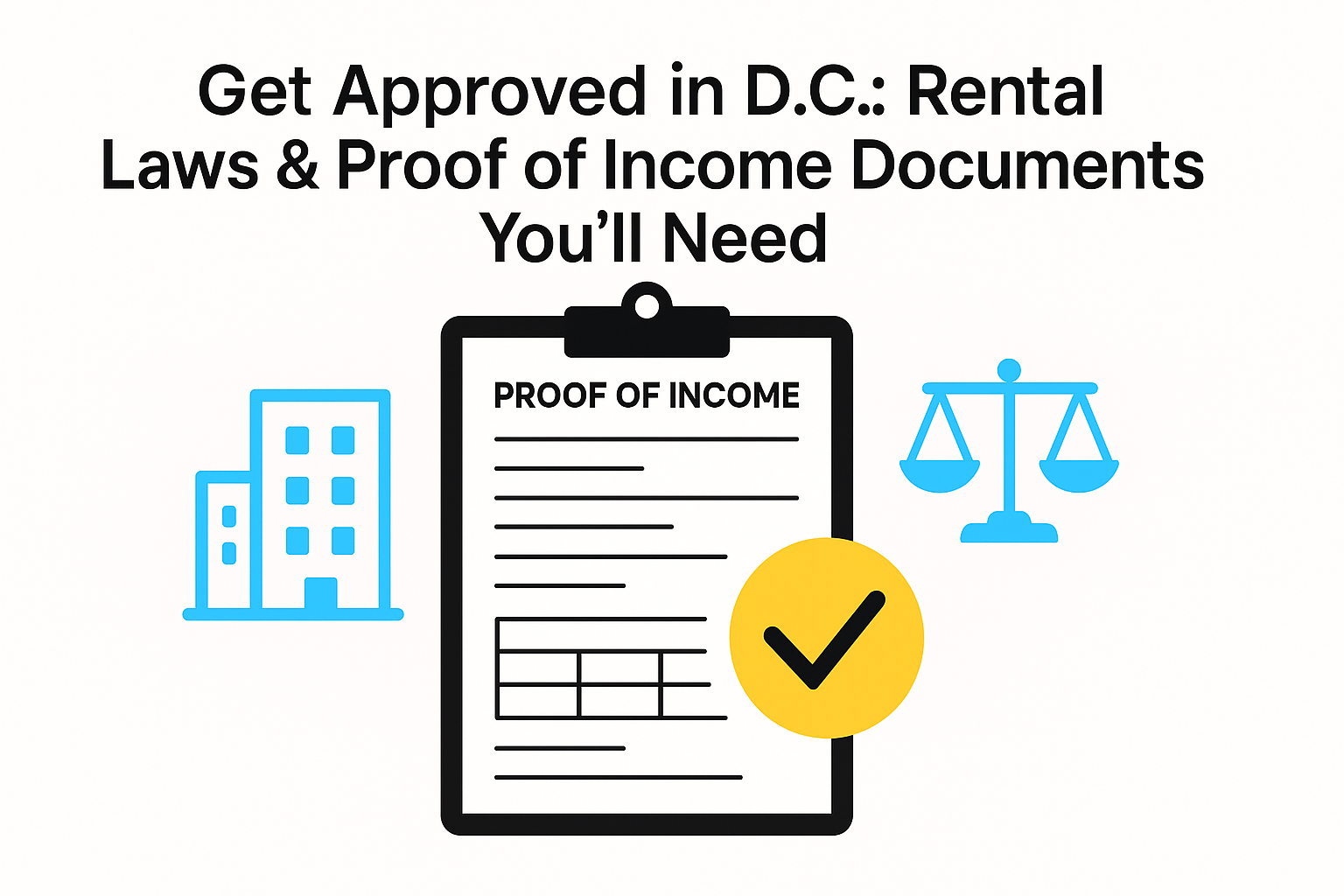



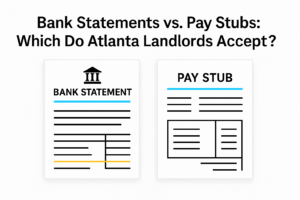
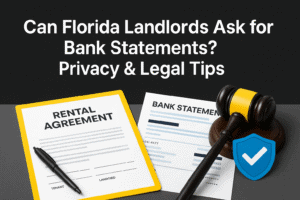
Add comment